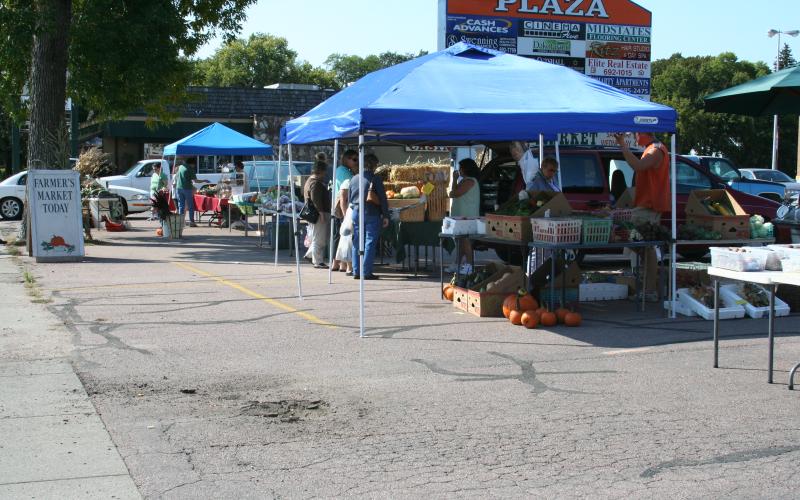Throughout the country and in the state of South Dakota, people are showing more interest in selling their own food products and starting their own business. The opportunity to design, manufacture, market, distribute, and sell one’s product is an exciting venture for the food entrepreneur. In the state of South Dakota, home processors have the opportunity to sell baked goods and canned goods under the home processing cottage food laws at venues such as road side stands, Farmer’s Markets, and church bazaars. Recently, home processors have been asking the question of what is required to sell food in retail stores such as grocery stores and convenience stores. This article will provide guidance to processors on what requirements they must follow to meet all federal and state regulations for selling products at Farmer’s Markets, retail, and for interstate commerce.
Farmer’s Markets
Food that is sold to Farmer’s Markets or roadside stands is subject to the Home Processed in South Dakota Codified Law 34-18. Foods that are allowed to be sold include fresh fruits and vegetables, canned goods, and baked goods. SDSU Extension has written two articles regarding the sale of baked goods and canned goods. For the sale of canned goods, only acid or acidified canned goods are allowed to be sold. These products will have either a natural pH of 4.6 or lower or will be acidified to have a pH of 4.6 or lower. These products must be reviewed by a third party processing authority and tested for either pH to be below 4.6 or water activity to be below 0.85. The codified law can be found on the South Dakota Legislature website SD Legislature Home Processing Food Law. Lastly, only non-temperature controlled baked goods such as bread, cake, and cookies are also allowed to be sold at Farmer’s Markets. Non-temperature controlled baked goods do not need to be reviewed in order to be sold. Beyond selling non-temperature controlled baked goods, acid and acidified canned goods, and fresh fruits and vegetables, no other products are allowed to be sold at Farmer’s Markets.
How we Can Help
- SDSU Extension has an individual that is a certified processing authority for acidified and acid foods. Therefore, processors can have their food reviewed and approved by SDSU Extension. SDSU Extension will also provide the written verification notice which is necessary to sell canned products at Farmer’s Markets.
- Additionally, SDSU Extension is able to provide an ingredient declaration and nutrition facts panel based off of the recipe provided by the processor.
- Ultimately, it is the responsibility of the processor to ensure the accuracy of the label, but SDSU Extension can provide this using Genesis R&D Labeling software. The cost is $85 per product.
Retail Sales
Any product that is sold wholesale or interstate will fall under Food and Drug Administration (FDA) jurisdiction. Wholesaling is the sale and distribution of goods to specific customer types such as those most commonly referred to as resellers. Resellers are traditionally retailers, other wholesalers or merchants who will resell the good to an end user. However, if a product is sold at retail directly to the end user and is also sold intrastate, it falls under the South Dakota Department of Health's Jurisdiction 34-18-34 to 34-18-38. Retail differs from wholesale in that retail stores typically charge a slotting fee for shelf space. The processor will typically pay a slotting fee to sell their merchandise at a retailer and thus directly sells to the end user. Processors who sell directly to the end user at retail stores fall under the Department of Health’s jurisdiction.
When a processor chooses to sell directly to a retail store, they must ensure that they are processing out of a commercial kitchen. There are requirements set forward in South Dakota Codified Law 44:02:07. Kitchens that are certified, must be registered with the department of health and must comply with the aforementioned laws. The home processor that sells to retail, must ensure that all food products that are sold at retail are processed out of the commercial kitchen.
Labeling Requirements
Additionally, it is the home processor’s responsibility to ensure that the product is properly labeled. The FDA requires that food is appropriately labeled in accordance with the Federal Food, Drug and Cosmetic Act (FD&C) (Section 403 – Misbranded Food) and The Fair Packaging and Labeling Act (FPLA). There are a number of required sections for an FDA-Compliant food label which includes the following:
- Principal display panel
- Information panel
- Statement of identity
- Net content statement
- Ingredients statement
- Place of business
- Nutrient panel (unless exempt through Title 21 of the Code of Federal Regulations (21 CFR) 101.9(j)(1) and 21 CFR 101.36(h)(1)
- Health claims
- Structure function claims
- Dietary supplements
- Contact Information – Address and Phone Number
The FDA has a labeling course summary page FDA Labeling Course that goes into detail around requirements for each required section of the food label. This site can be used as guidance to help the food entrepreneur understand the general requirements needed for an FDA compliant label. SDSU Extension is also available to answer questions regarding labeling.
How we Can Help
- SDSU Extension has an individual that is HACCP certified and PCQI certified that can act as an information resource to provide data regarding food safety considerations on the product and process. This information can be leveraged by the processor to help the processor understand the hazards which are present within the food and how to appropriately control the identified hazards.
- SDSU Extension, in conjunction with the Animal Disease and Research Food Safety Lab, can also test the product for pH and water activity. These two attributes are crucial in understanding pathogen growth and survival.
- Additionally, SDSU Extension can review the processor’s label to check if it is generally meeting the FDA Labeling requirements as outlined in the FDA Labeling Course.
- Lastly, SDSU Extension is able to provide an ingredient declaration and nutrition facts panel based off of the recipe provided by the processor.
- Ultimately, it is the responsibility of the processor to ensure the accuracy of the label, but SDSU Extension can provide this using Genesis R&D Labeling software. The cost is $150 per product.
Interstate or Wholesale Commerce
If a processor chooses to sell their products interstate, or across state borders, they are subject to FDA jurisdiction. Likewise, if a processor decides to sell their product wholesale, they are subject to FDA jurisdiction. Wholesaling is the sale and distribution of goods to specific customer types such as those most commonly referred to as resellers. Resellers are traditionally retailers, other wholesalers or merchants who will resell the good to an end user. A processor would also need to be FDA compliant if they have online sales as online sales constitute as interstate commerce. If a processor falls under FDA jurisdiction, they are required to register with the FDA.
The FDA requires that any domestic and foreign facilities that manufacture, process, pack or hold food, as defined 21 CFR 1.227, for human or animal consumption in the U.S. must register with FDA effective December 12, 2003. This registration is required to determine the location and source of potential bioterrorism incidents or an outbreak of food-borne illness; and to quickly notify facilities that may be affected. There is no fee for registration or updates to a registration update. Facilities that don’t have to register include private residences of individuals, farms, restaurants, retail food establishments such as grocery stores, delis roadside stands, nonprofit food facilities and more. Failure to register the facility, update required elements, or cancel registration in accordance with section 415 of the FD&C Act and applicable regulations is a prohibited act under the FD&C Act. The Federal government can bring a civil action against persons who commit a prohibited act or can bring a criminal action in Federal court to prosecute persons who are responsible for the commission of a prohibited act, or both. There are guidelines provided by the FDA in terms of what is needed to become compliant with the FDA. Additionally, if the facility is required to register with the FDA, they are also required to comply with FSMA requirements. There are different compliance dates based on the size and sales of the facility. Below are some requirements that need to be considered if a processor is selling interstate or wholesale:
- Guidance for Industry: What you Need to Know About Registration of Food Facilities; Small Entity Compliance Guide
- 21 CFR 1.227 Part 1 Subpart H - Registration of Food Facilities
How we Can Help
- SDSU Extension has an individual that is HACCP certified and PCQI certified that can help develop a food safety plan to be compliant with FSMA. The cost is $750-1500.


